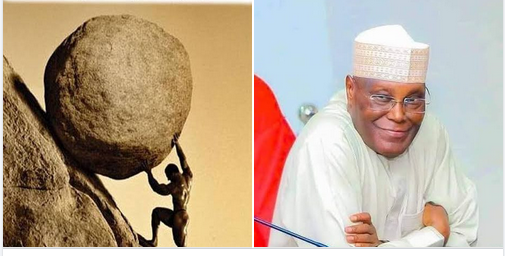What immortal thirst drives a man to the same well of ambition, even when it has repeatedly proven dry? From what fountain of delusion does he draw the strength to begin the same doomed ascent with the gusto of a first-timer? Is it a noble calling for the nation’s soul, or the desperate vehemence of a gambler convinced his final hand must be a winning spin?
In the every slippery arena of Nigerian politics, where ambition is the currency and power the ultimate deity, these questions find their most poignant embodiment in one man: Atiku Abubakar. He is the eternal bridesmaid of Aso Rock, whose political odyssey mirrors the torments of Sisyphus, the mythical Greek king cursed to roll a colossal boulder up a hill, only to watch it roll back down each time it nears the summit. This scenario is captured by Albert Camus in his epic classic, The Myth of Sisyphus. As 2027 beckons, the boulder is once again at the foot of the hill, but this time, the aging Sisyphus, soon to be an octogenarian, prepares for what might be his final, most daring push.
For over three decades, from the primaries of 1993 to the electoral losses of 2007, 2011, 2015, 2019, and 2023, Atiku has heaved this boulder of presidential ambition. It is a fixation so profound, it has become his political signature. He and his acolytes attempt to paint this Sisyphean struggle in the heroic hues of a William Wallace, a messianic figure rallying a fractured people against tyranny. They speak of a Promethean calling, a man bound by a divine mission to rescue Nigeria from itself. But this is a grand illusion, a cinematic gloss over a tale of raw, personal ambition. Wallace screamed “Freedom” for his people; Atiku’s battle cry, translated from his political body language, is simply “Me.” Prometheus stole fire for humanity; Atiku’s quest seems more aligned with securing the golden flame for his own political family.
To understand the futility of this next ascent, one must first examine the titan’s feet of clay, and there is no better sculptor to reveal the cracks than his former boss, Olusegun Obasanjo. The Owu chief, a man not known for mincing words, has provided the most devastating character reference in modern Nigerian history. Obasanjo once declared that picking Atiku as his vice president was a “mistake” and swore, “If I support Atiku for anything, God will not forgive me.” Though a temporary political truce was brokered in 2018, the initial verdict, seared into the public consciousness, remains. Obasanjo painted a portrait of a man of questionable loyalty and insatiable ambition, a characterization that undermines any claim to messianic leadership. This is not the stuff of heroes; it is the portrait of a political operator whose primary allegiance is to the self.
Now, this Sisyphean figure has reportedly set his sights on a new contraption, the African Democratic Congress (ADC), as his potential political ark. But this is no chariot of the gods. It is a rickety vessel populated by what Senator Ali Modu Sheriff calls “political jobbers” throwing up names of big politicians to “deceive people of a popularity they don’t have.” Any potential coalition involving figures with their own towering ambitions is a study in conflicting interests. It is a vessel where every captain wants to steer, a recipe for an inevitable voyage to nowhere.
The grim picture of this potential alliance is brought into sharp relief by the pronouncements of Senator Ali Modu Sheriff, a formidable political force from the North. Sheriff, a former governor and one-time PDP chairman, acts as the oracle revealing the tragic flaw in Atiku’s 2027 script. He speaks of a pact among Northern leaders to concede the presidency to the South for two terms, until 2031. “We, the leaders in the north had an agreement to give two terms until 2031, to Southerners to produce President and we don’t deviate from agreement,” Sheriff declared. This single statement is the gust of wind that could send Atiku’s boulder careening back down the hill. It suggests that while Atiku is busy assembling his forces, the very foundation of his Northern political base has committed to a different path.
Sheriff twists the knife further, mocking Atiku’s waning influence in his own backyard. He questions how Atiku’s ADC could possibly defeat incumbent governors in Adamawa or Bauchi, where Atiku’s sponsored candidates were defeated in 2023. “Even in Adamawa where Atiku is from, it’s a state under PDP today and I don’t see Atiku defeating Fintiri, afterall, the governor defeated Atiku’s candidate, Aisha Binani in 2023,” Sheriff noted. This is the ultimate political humiliation: the titan of Nigerian politics rendered a paper tiger in his own homestead.
And so, the stage is set for the final act. As the octogenarian Sisyphus begins his laborious push, he is weaker, his political base is compromised, and his potential new vehicle is a combustible mix of clashing egos. Waiting, not at the top of the hill but firmly in control of its commanding heights, is President Bola Tinubu. A master political strategist in his own right, Tinubu is not idly watching this drama unfold. He is consolidating his power, shoring up his alliances, and preparing for the inevitable confrontation. While Atiku is consumed by the Sisyphean task of pushing upwards, Tinubu is preparing the final, decisive uppercut.
The 2027 election, therefore, will not be the moment of Atiku’s coronation. It will be the final, tragic roll back. The boulder, pushed by weary, aged hands and undermined by political realities on the ground, will tumble down the slopes of Aso Rock one last time. The myth of the messiah will be shattered, the Herculean facade will crumble, and the curse of Sisyphus will find its ultimate fulfillment in the twilight of a long and fruitless quest.


